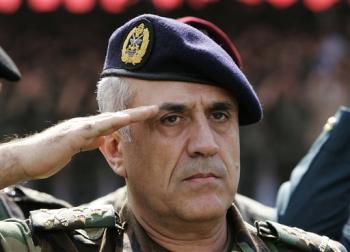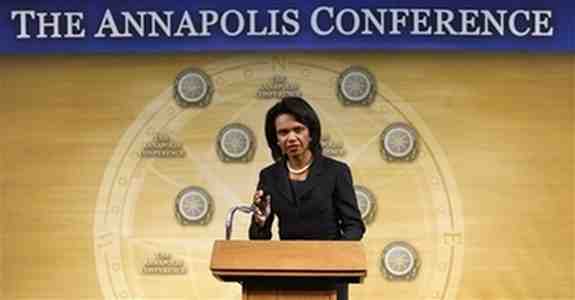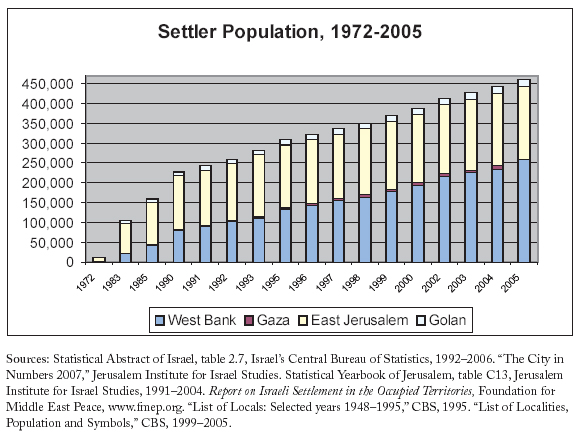A “different dynamic” in American diplomacy
If war follows the failure of diplomacy, it’s natural that the failure of war should lead to the resurrection of diplomacy. George Bush might not clearly grasp this, but there are strong indications that it is obvious to many of his closest advisers. The latest evidence comes from Lebanon.
 For the last week, Lebanon has been without a president but now, after a standoff that has lasted months, the political factions (always simplistically described in the Western media as being pro-Western or pro-Syrian) appear to have agreed on a compromise. Washington didn’t make it happen but it could have stood in the way. Instead, the administration is now willing to accept that Lebanon’s next president, Syria’s preferred candidate, will be General Michel Suleiman.
For the last week, Lebanon has been without a president but now, after a standoff that has lasted months, the political factions (always simplistically described in the Western media as being pro-Western or pro-Syrian) appear to have agreed on a compromise. Washington didn’t make it happen but it could have stood in the way. Instead, the administration is now willing to accept that Lebanon’s next president, Syria’s preferred candidate, will be General Michel Suleiman.
Some commentators predicted this outcome months ago. Back on August 15, a blogger calling himself, “Outlaw Josey Wales,” wrote, “The powers-that-be have decided General Michel Suleiman/Sleiman will be the next president of Lebanon.” Today, the Wall Street Journal (via Syria Comment) reports:
In recent days [pro-Western] March 14 politicians, with Washington’s consent, agreed to a compromise candidate for the presidency. Gen. Michel Suleiman, commander of the Lebanese Armed Forces, worked closely with Damascus during its military occupation of Lebanon and is already receiving support from some of Syria’s Lebanese political allies.
March 14 leaders say the general’s selection, while not their first choice, could help stabilize Lebanon, because of his leadership of a Lebanese military increasingly viewed as a unifying force in their country.
“Michel Suleiman is well-known to the Hezbollah and the Syrians,” said Walid Jumblatt, a key leader of March 14. “If the Syrians don’t want Suleiman, it means they don’t want stability in Lebanon.”
The concession on the Lebanese president comes amid a broader push by the U.S. and its allies to re-engage Damascus in other ways. American and Israeli strategists view this initiative as aimed at breaking Syria’s alliance with Iran, Hezbollah and the Palestinian militant group Hamas, which have all increased their influence across the Middle East in recent years. It is also aimed at gaining greater support from Syria in cutting off militants infiltrating into Iraq.
The administration wants to characterize the Lebanese presidential choice as a concession by its allies:
A high-ranking US official was quoted by the Kuwait News Agency (KUNA) as saying that Washington has no objections to agreements among the Lebanese on the election of army commander General Michel Suleiman for president. “The US did not strike any deal with Syria regarding Lebanon at the Annapolis conference,” the official, who spoke on condition of anonymity told KUNA. “We understand the concerns of the Lebanese on this issue,” he added. “The US is separating Lebanon from the other pending problems in the region.” The US official said that Lebanon is not up for negotiation, especially not with Syria. “We only refer to Lebanese-Syrian relations when we are calling on Damascus to stop meddling in Lebanon’s internal affairs,” he said.
Mark those words carefully: If the US did not strike any deal with Syria regarding Lebanon at the Annapolis conference it was because the deal had been struck in advance. This is what the New York Times reports:
Syria, the most important outside influence over Lebanese politics, had hesitated until the last minute over whether to attend the conference.
Immediately after the talks, Syrian allies in Lebanon endorsed the first major political breakthrough. Analysts say the talks could thaw strained relations between Syria and the United States.
“The Syrians did not want to go to Annapolis, and without them the conference would have been a failure and would have weakened the Arabs,” said Talal Atrissi, a political analyst and sociologist at Lebanese University. “The Syrians traded their participation, which did not cost them anything, with a deal on the Lebanese presidency.”
Another breakthrough then came after the conference when on Thursday, Christian leader Michel Aoun, a retired general and a former army chief who was seeking the presidency himself and is backed by Syria, indicated that he is “open” to Suleiman becoming president. Lebanese commentator, Michael Young, that day had written, “Aoun will swallow poison before saying yes to Suleiman.” I guess the poison was less bitter than Young imagined.
So why should observers in the United States be surprised by the latest turn of events in the generally mystifying process of Lebanese politics? Here’s why. This is what the astute Syrian political analyst and journalist Sami Moubayed has to say:
…if the Syrians are able to get their way, they would opt for Michel Suleiman, the current army commander. Washington DC is not too enthusiastic about him because he is politically independent; too independent for Washington’s taste. He is committed to combating Israel, supporting Hizbullah, and friendship with Syria. His one slogan has been “Israel is the enemy”, something that greatly pleases Damascus but is frowned upon by 14 March. If elected, he would certainly work for a greater role for Hizbullah in the government, and might even turn a blind eye to their activities in south Lebanon, as did Elias Hrawi in the early 1990s, and Lahoud in 1998-2006. Also to the displeasure of 14 March was a recent remark by the army commander, “Fatah Al-Islam is linked to Al-Qaeda not Syria.”
Washington has plenty of reasons not to like Suleiman. The fact that they have now given their consent to his becoming Lebanon’s next president makes it quite transparent: the realpolitik faction inside the administration is not simply ready to do business with Syria — business is already underway.


